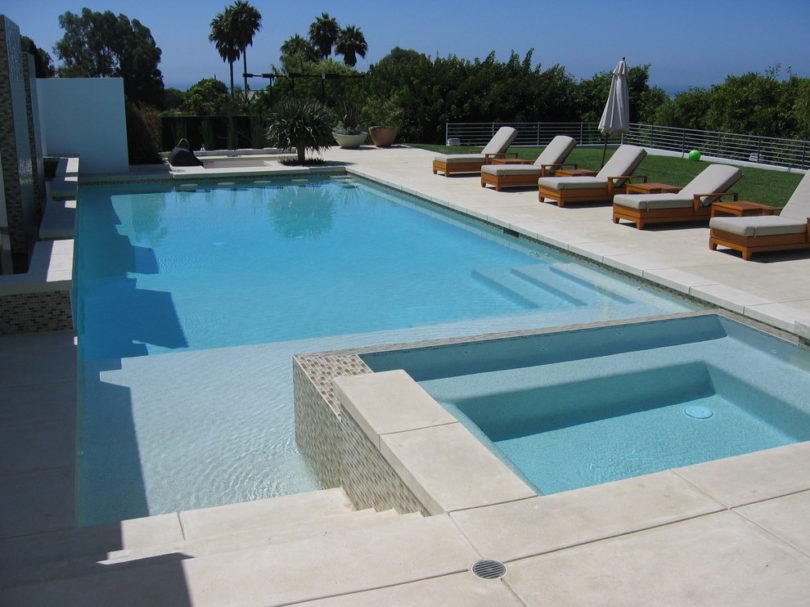Choosing the right pool system is crucial for ensuring long-term satisfaction. Saltwater pools use saltwater chlorinators to maintain water cleanliness with minimal manual intervention!
These chlorinators convert salt into chlorine, providing a stable and automated sanitation process. In contrast, traditional chlorine pools require regular chemical additions and more frequent monitoring of pH levels. This method demands more hands-on maintenance but offers precise control over water chemistry. Both types have unique characteristics that cater to different preferences and needs, making it important to understand the distinctions before deciding.
Maintenance differences
Saltwater pools, with their built-in chlorinators, generally require less manual effort. These systems automatically convert salt into chlorine, stabilizing chlorine levels with minimal chemical adjustments. However, salt can cause corrosion to pool parts, necessitating regular inspections and occasional replacements of components like ladders and fixtures.
Traditional chlorine pools involve more hands-on work. Owners must regularly add chlorine, monitor pH levels, and frequently test the chemical balance. This method can be more time-consuming and may present a steeper learning curve for new pool owners. Nevertheless, it allows for precise control over water chemistry, which some owners may find beneficial.
Health and safety considerations
Saltwater pools are often noted for being gentler on skin and eyes. The water feels softer, and because the salt levels are much lower than in seawater, it’s typically kinder to sensitive skin and eyes. This is beneficial for families with young children or individuals with skin sensitivities.
On the other hand, traditional chlorine pools can sometimes irritate due to higher chlorine levels. Prolonged exposure to chlorine may lead to dry skin and itchy eyes. However, when managed correctly, chlorine effectively eliminates harmful bacteria and ensures pool hygiene.
Cost analysis
Saltwater systems typically have higher initial costs due to purchasing a saltwater chlorinator and potential upgrades to existing equipment. These systems often lower ongoing expenses because fewer chemicals are needed, and maintenance is generally less frequent.
Conversely, traditional chlorine pools generally come with lower upfront costs. However, the long-term expenses can be significant, as they require consistent chemical purchases and possible professional maintenance services. This ongoing need for chemical balancing can accumulate over time, affecting the total cost of ownership.
While both systems have their financial implications, it’s important to consider your budget and long-term financial planning when deciding between a saltwater or traditional chlorine pool.
Environmental impact
Saltwater pools are generally more eco-friendly because they need fewer chemicals, and saltwater chlorinators help reduce chlorine release into the environment. However, improper management of salt levels can negatively affect local plant life. Traditional chlorine pools use more chemicals, which can harm the environment if improperly handled and disposed of. Chemical runoff from these pools can damage surrounding ecosystems. Opting for eco-friendly products and practicing responsible disposal can help mitigate these environmental concerns.
Managing both pools carefully is essential to minimize their impact on nature.
User experience and comfort
The user experience can vary significantly between saltwater and traditional chlorine pools. Many people find saltwater pools more enjoyable to swim in due to the softer and silkier feel of the water. This pool type often feels gentler on the skin and doesn’t cause as much eye irritation, making it a preferred choice for those with sensitive skin or young children.
In contrast, traditional chlorine pools can have a distinct smell, which some find unpleasant. They might also cause dryness or irritation to the skin and eyes if the chlorine levels are not perfectly balanced. However, some swimmers appreciate a well-maintained chlorine pool’s classic, clean feeling. The experience in a chlorine pool can be very refreshing, especially when the water chemistry is managed correctly.
Making the right choice for you
Deciding on the right pool type requires balancing several factors. Saltwater pools are ideal for those who prefer low maintenance and softer water. The automatic chlorination system in these pools means fewer manual adjustments, making them a convenient choice for busy families or those new to pool ownership.
Traditional chlorine pools offer that precision for individuals who prefer more control over their pool’s chemistry. Regular monitoring and chemical adjustments allow owners to fine-tune the water quality, which can be beneficial in maintaining a clean and safe swimming environment.
Another important consideration is the initial investment versus long-term costs. While saltwater systems may have higher upfront costs, they often result in lower ongoing expenses. Traditional chlorine pools, on the other hand, have lower initial costs but can incur higher long-term maintenance expenses due to regular chemical purchases.
Environmental impact is also a factor; saltwater pools generally use fewer chemicals, which can be a more eco-friendly option. However, improper management can cause environmental harm, so responsible maintenance is crucial for both types. By evaluating these factors and considering your specific needs and preferences, you can decide which pool type is best suited for you.
Choosing between saltwater and traditional chlorine pools depends on your needs and lifestyle. Evaluate your priorities — ease of maintenance, initial and long-term costs, environmental impact, or user comfort — to make an informed choice that best suits your lifestyle.




